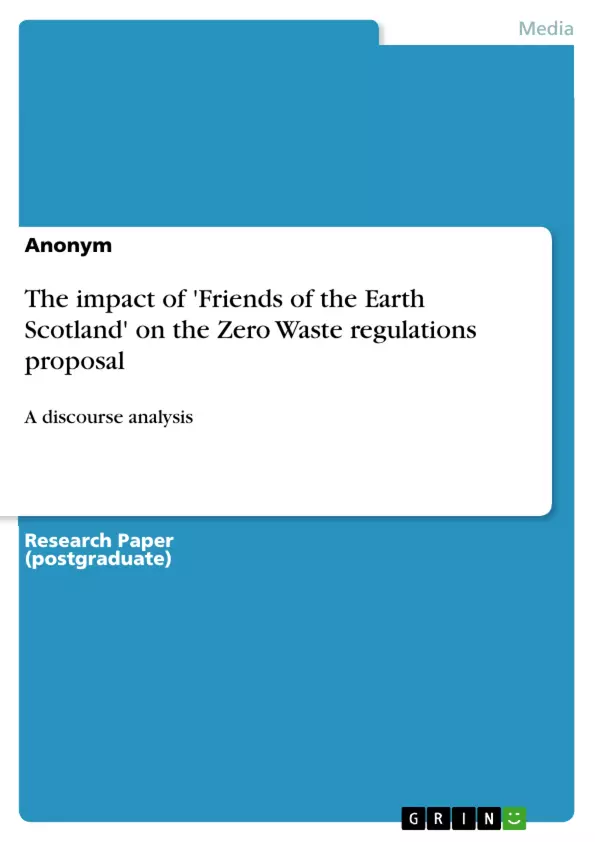The impact of 'Friends of the Earth Scotland' on the Zero Waste regulations proposal in Scotland is analysed in this research paper with the main goal to describe the discourses which were used to influence the MSPs rather than to investigate why the final regulations were presented without any appropriate amendments. This angle is more of interest than the angle of industries and local authorities because it illustrates how an environmental pressure group could persuade MSPs through skillful usage of language.
Inhaltsverzeichnis (Table of Contents)
- Introduction
- Critical discourse analysis
- Conducting critical discourse analysis
- Discourse analysis of the FOES's policy briefing paper
- Conclusion
Zielsetzung und Themenschwerpunkte (Objectives and Key Themes)
This report analyzes a policy briefing paper from Friends of the Earth Scotland (FOES) to understand how the environmental pressure group uses discourse to influence Scottish Members of Parliament (MSPs) on the Zero Waste regulations proposal. The analysis focuses on describing the discourses employed, highlighting the use of language to persuade MSPs rather than investigating why the final regulations were implemented without amendments. The analysis specifically considers the impact of FOES's use of language on the MSPs, demonstrating how environmental pressure groups can effectively influence policy discussions.
- Discourse analysis and its application in policy analysis
- The use of language and its role in shaping public perception and policy decisions
- The influence of environmental pressure groups on political discourse and decision-making
- The role of environmental discourses (e.g., sustainable development, green consciousness change) in shaping public policy
- The impact of power dynamics and environmental justice concerns on waste management policy
Zusammenfassung der Kapitel (Chapter Summaries)
- Introduction: The introduction provides context for the analysis, highlighting the changing public perception of the Zero Waste plans and the subsequent debate surrounding incineration proposals. It emphasizes the importance of understanding how environmental pressure groups use discourse to influence MSPs.
- Critical discourse analysis: This section explains the choice of critical discourse analysis as the methodological framework for the study. It discusses the key concepts and theoretical underpinnings of the approach, emphasizing the role of language in constructing power relations and shaping worldviews.
- Conducting critical discourse analysis: This section outlines the methodological steps used in the analysis, emphasizing the need for a detailed consideration of language, the identification of entities and relationships, and the recognition of structures and beliefs behind the language. It highlights the use of Jäger's methodological approach.
- Discourse analysis of the FOES's policy briefing paper: This section delves into the analysis of the briefing paper, identifying the key discourses employed: survivalism, sustainable development, and green consciousness change. It explores the hierarchical relationships between various entities, including the Scottish Government, politicians, local authorities, industries, communities, and environmental groups. It also examines the concepts of environmental injustice and decentralization, highlighting how they are presented in the briefing paper.
Schlüsselwörter (Keywords)
The key terms and focus topics of the text revolve around the concepts of critical discourse analysis, environmental discourse, policy influence, Zero Waste regulations, and environmental pressure groups. These terms are particularly relevant for understanding the dynamics of political decision-making and the impact of language on policy development. The analysis explores the specific discourses employed by Friends of the Earth Scotland (FOES) to influence Scottish Members of Parliament (MSPs) on the Zero Waste proposal, highlighting the importance of understanding power dynamics and environmental justice concerns in the context of waste management policy.
Frequently Asked Questions
What is the main goal of this research on Friends of the Earth Scotland?
The research analyzes how the environmental group used specific discourses and language to influence Scottish Members of Parliament (MSPs) regarding Zero Waste regulations.
What is Critical Discourse Analysis (CDA)?
CDA is a methodological framework used to study how language constructs power relations, shapes worldviews, and influences political decision-making.
Which environmental discourses were identified in the FOES briefing paper?
The analysis identified discourses of survivalism, sustainable development, and green consciousness change.
How do environmental pressure groups influence policy?
They use skillful language to persuade politicians, frame environmental justice concerns, and challenge existing power dynamics in waste management.
What is the role of "environmental justice" in this context?
It highlights the impact of waste management decisions (like incineration) on local communities and advocates for a more decentralized and equitable approach.
- Quote paper
- Anonym (Author), 2011, The impact of 'Friends of the Earth Scotland' on the Zero Waste regulations proposal, Munich, GRIN Verlag, https://www.grin.com/document/972386



